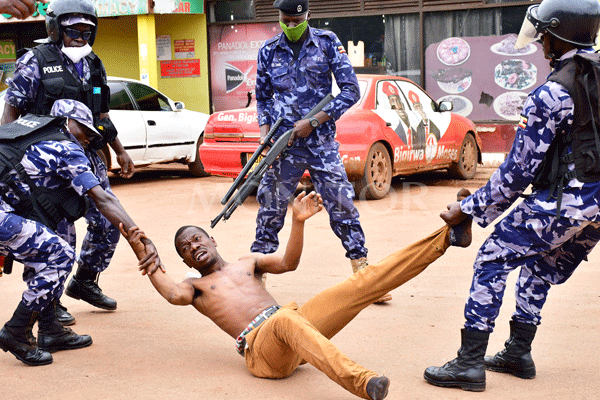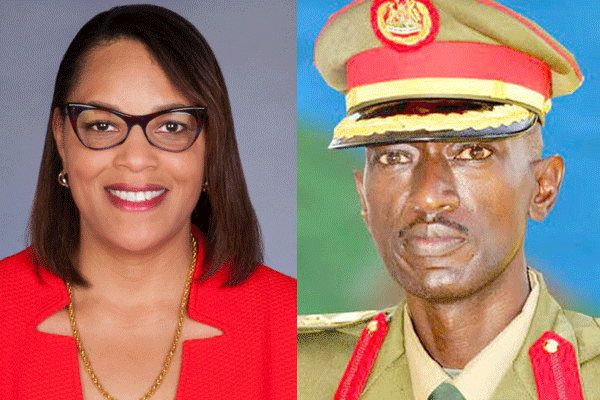Prime
US pushes for tougher action on human rights violators

Police officers arrest a member of the campaign team of National Unity Platform (NUP) party presidential candidate Robert Kyagulanyi, aka Bobi Wine, in Jinja on November 18, 2020. PHOTO/FILE
What you need to know:
- The super power says it is committed to the use of what it describes as a “full range of tools” against the perpetuators in any part of the world.
Less than a fortnight after it sanctioned the Chief of Military Intelligence (CMI), Maj Gen Abel Kandiho, the US government has expressed readiness to take further action against all those accused of human rights violations and acts that impede the growth of democracy.
In a statement issued on Thursday, the spokesperson of the US Embassy in Kampala, Mr Anthony Kujawa, said the US is committed to the use of what he described as a “full range of tools” against the perpetuators in any part of the world.
“That (action) includes not only punitive measures against those who commit gross violations of human rights and suppress democracy, but also apolitical measures to strengthen democratic institutions, strengthen civil society capacity, and support local human rights defenders and local initiatives to promote citizen participation in the democratic process,” Mr Kujawa said.
The US, Mr Kujawa added, is committed to working with others to ensure the advancement of democracy the world over.
“…we will continue to be an advocate for democracy, human rights, and the rule of law in Uganda and elsewhere. We remain committed to working with all parties with a genuine commitment to advancing democracy,” he said.
Kandiho sanctions
Whereas the Uganda People’s Defence Forces (UPDF) was quick to protest the December 7 financial and travel sanctions against its CMI, the Department of State issued a report in March in which it indicted Maj Gen Kandiho and other government officials for their role in rights violations.
The ‘2020 Country Reports on Human Rights Practices’ accused members of Uganda’s security forces of having committed various abuses, including participation in killings of supporters of the political Opposition
Sources in diplomatic circles told Sunday Monitor that the sanctions against Maj Gen Kandiho were precipitated by the contest of the said report.
Maj Gen Kandiho was sanctioned for, among other allegations, superintending over an agency whose operatives illegally held incommunicado and tortured critics and political opponents of President Museveni’s government.
In the wake of the announcement of the sanctions, the spokesperson of the UPDF, Brig Gen Flavia Byekwaso, described the move on the part of the US as “a unilateral financial sanction”, which she said was arrived at without giving Maj Gen Kandiho a fair hearing.
“As a country and UPDF in particular, a reputable government institution, we are disappointed that such a decision could be made by a country we consider friendly, a partner and a great ally, without due process and in total disregard of the principle of fair hearing coupled with failure to make the necessary consultation…” she said.
Mr Kujawa did not directly address himself to Brig Byekwaso’s comments, but pointed out that a number of government officials had been engaged as part of the process of compilation of the ‘2020 Country Reports on Human Rights Practices’.
He said government officials were made aware of the accusations made against them before the report was published.
“The process of completing the human rights report includes a rigorous review of a wide range of information. That process also includes a regular dialogue with a range of Ugandan government officials regarding the human rights concerns documented in the report,” Mr Kujawa said.
The report
The report, which is published on the State Department’s website, accuses the security forces of involvement in politically-motivated killings.
The report also names Ugandan security forces as being involved in the abduction of several supporters of the Opposition National Unity Platform (NUP) party as they participated in the political activities. The report says many of the NUP party supporters remain unaccounted for.
“The government neither acknowledged the persons were missing nor complied with measures to ensure accountability for disappearances. In addition, the UPF did not share any findings into the 2019 disappearance of [NUP party leader Robert] Kyagulanyi [alias Bobi Wine] supporter John Bosco Kibalama, who remained missing,” the report read in parts.
Using the example of Mityana MP Francis Zaake’s arrest and treatment at Naguru, the report further says there was credible evidence that the security agencies tortured and physically abused supporters of the Opposition.
Security forces are also indicted for arresting, brutalising and at times killing civilians for allegedly flouting regulations aimed at combating the spread of Covid-19. The report cites, among others, the April 3, 2020, raid by security forces on Elegu Town in northern Uganda, which left many civilians brutalised for allegedly violating the curfew.
The report further accuses the authorities of doing nothing to bring the guilty parties to book.
“Impunity was a problem, and it was widespread in the [Uganda Police Force] UPF, UPDF, the Uganda Prisons Service (UPS), and the Executive branch. The security forces did not take adequate measures to investigate and bring to account officers implicated in human rights abuses, especially in incidents involving members of the political Opposition,” the report further reads in part.
Other accusations
The report also notes that detention centres are overcrowded and that conditions therein are harsh and in some cases life-threatening.
Other accusations include suppression of freedom of expression and muzzling the media, censorship, arresting without warrants, detention of suspects beyond the mandatory 48 hours allowed by the Constitution, denial of fair public trials, arresting suspected sympathisers of the Opposition on trumped up charges and, arbitrary interference with privacy.
Government, the report says, violated the citizens’ Internet, academic and cultural freedoms and also constantly violates the right to assemble and demonstrate.
By press time, it was not possible to talk to the State Minister for Foreign Affairs in-charge of International Affairs, Mr Henry Oryem Okello.
The minister is said to be away in Turkey and could not engage Sunday Monitor in a discussion.
However, in an interview late last month, Mr Oryem told Sunday Monitor that the US’ condemnation of Uganda has often been the result of failure to appreciate the conditions in which Uganda operates.
“Because they don’t appreciate the structures and how systems in many parts of the world operate, they simply believe that because they are a world power, they can get their way hence the many mistakes they’ve made,” the minister said.
Museveni on torture
Early in August during a televised speech that focused on only human rights issues, President Museveni condemned acts of torture carried out by members of the armed forces and warned against barking at or beating suspects, detention of suspects for long periods and deportation of foreigners without trial, saying such actions disadvantage the country.
It is not clear whether Mr Museveni was speaking in response to the contents of the ‘2020 Country Reports on Human Rights Practices’.
“Beating captives is wrong. Why? You undermine your case in court — when the court discoveres that you got information through torture. Secondly, on account of beating, somebody may admit what is not true. Torture, assassination, et cetera, are used by lazy people who are not ready to do more work using gaps in the stories of the criminals if they are telling lies,” Mr Museveni said.
He promised to eliminate acts of torture, which he blamed on individual officers and failure by senior commanders to give appropriate instructions to those under their command.
Background...US concerns
● Torture and degrading treatment
● Extrajudicial killings
● Arbitrary arrest and detention
● Undermining the democratic process
● Pathetic conditions in detention centers




